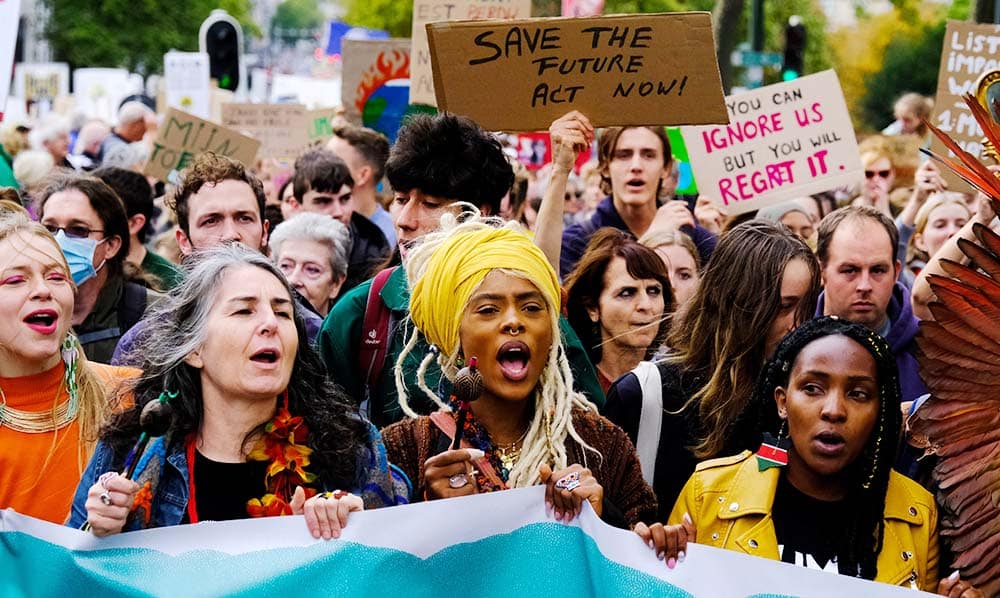The UN climate conference taking place in Egypt this week is an exercise in organized hypocrisy.
One of the most striking images from the popular Science Fiction TV series The Expanse lasts just 2 seconds. During the opening credits we see a view-from-space timelapse of Ellis Island in New York being submerged by rising sea levels, until the waves are lapping around the skirts of Lady Liberty. Then, as more time passes, this water is pushed back as sea walls are erected and an artificial island is created around the monument.
In this simple animation a whole possible timeline is laid out. In this future climate change is not addressed effectively. The oceans rise, and only then adaptation occurs.
Let’s assume that such adaptation is technically achievable, as many believe it is. The question then becomes, why are we not proving capable of mitigation? Prevention, after all, is better than cure.

If we look at the farce unfolding in Egypt this week, the 27th UN climate conference or COP27, we might find the answer to this question. First of all, it’s in Egypt with Egyptian foreign minister Sameh Shoukry acting as conference president. Before becoming foreign minister, Shoukry was Egypt’s Ambassador to the United States.
Egypt has ratified multiple human rights treaties and covenants, including the Convention against Torture and Other Cruel, Inhuman or Degrading Treatment or Punishment, and the Convention on the Elimination of All Forms of Discrimination against Women. It consistently violates both treaties.
In 2011 Abdel Fatah El Sisi, then a major general in the Egyptian Army, violated both in one day justifying grotesque “virginity tests” on female Egyptian protesters who were calling for democracy. That didn’t stop the then US Secretary of State John Kerry backing the 2013 coup that brought Sisi, now Egypt’s president, to power. Kerry is now the US Special Presidential Envoy for Climate.
The point is this – when a government violates an essential international treaty, it does not become a pariah state. Instead, it gets rewarded with prestigious global conferences, this one sponsored by Coca-Cola, among other multinational corporations. Why then, should agreements made at this 2022 UN climate conference be any different? The agreement reached at the UN climate conference in Paris in 2015, which is the main instrument to keep global warming below the limit of 1.5 degrees Celsius, is non-binding and voluntary to begin with. These international agreements, and the whole edifice of “international law” or the so-called “rules based international system” are a joke. A sham.
Holding this sham in the resort town of Sharm El Sheikh on Egypt’s Red Sea coast clearly underlines this assessment. It is the wink and the nudge world leaders make at one another. Don’t worry, it silently says, none of this is real. There will be no consequences for breaching this agreement, just as there aren’t for breaching previous, similarly toothless agreements.
It’s no surprise then, that since 1992, when the Earth Summit laid out the United Nations Framework Convention on Climate Change, carbon emissions have consistently risen.The only year this was not true was 2020, when the pandemic shut down large swathes of the global economy. This reduction was reversed in 2021. The system isn’t working and the failure of climate policy is a prime example.
What then is the alternative?
The alternative is global democracy – a world parliament capable of legislating global law, or world law, (rather than international law) which global institutions then enforce. There’s no point going into all the details of how we might think it should work here and now – those things, also, should be determined democratically. A global parliament would oversee the reform of other global institutions.
But why should global democracy succeed when national democracy, as in Egypt, cannot?
As this recent video from a lectures series on world federalism published on YouTube puts it:
Some people say it’s kind of mad to talk about global democracy, when even on the national level democracy is clearly receding and in crisis in so many countries… But supporters of global democracy point to that same reality, only with a completely different interpretation.
The crisis, we say, is not of democracy as such, but of national-level democracy. The democracy that, by definition, ends at the border of the state, while the powers that challenge it, are fundamentally global. Global corporations that are far larger than states so they can easily evade taxation and regulation, global environmental problems that today nobody is actually accountable for addressing, and staggering global inequality.
Such change is difficult to imagine. But history should give us hope. So should contemporary events such as the recent wave of uprisings in Iran. Not to mention protests in Tunisia and even China.
We may see protesters in Egypt defy the brutal regime and hold protests during the climate conference – ruining the dictator’s big event by holding protests this coming Friday 11 November. Alaa Abd El-Fattah, a prominent political prisoner and dual Egyptian-British citizen, has just announced he will stop drinking water, prompting a promise from British Prime Minister Rishi Sunak to raise the issue with the Egyptian government during the conference.
They have not forgotten, and neither should we, that what President Sisi lacks, along with the global system, is democratic legitimacy. A necessary (if not sufficient) condition of durably effective governance.
Until we achieve it at the global level we should expect the waters to keep on rising.
We believe in transparency. Check out the sources and the research conducted for this article through the video bibliography below.





